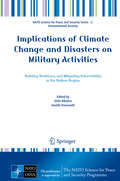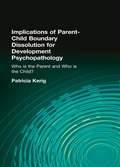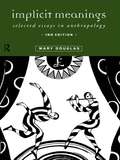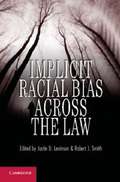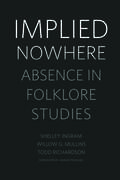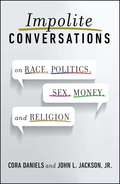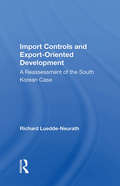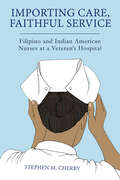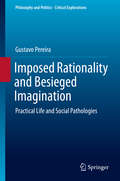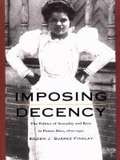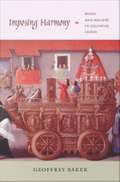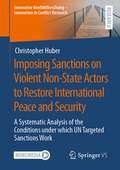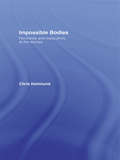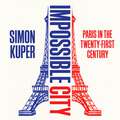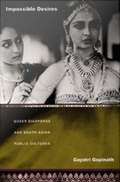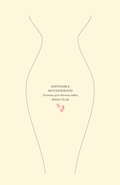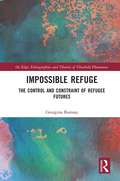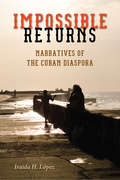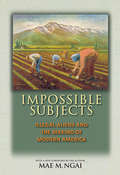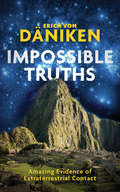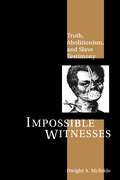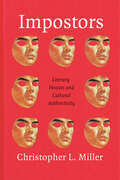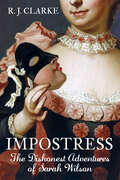- Table View
- List View
Implications of Climate Change and Disasters on Military Activities
by Orlin Nikolov Swathi VeeravalliThis volume provides preliminary recommendations on ways to educate and develop experience-based expertise among disaster response, security and other professionals from diverse backgrounds, whose current and future interests relate to crisis management. The book takes a multidisciplinary approach to improving regional security cooperation and to addressing the complex issues of climate change and disasters on military activities. The main aims of this proceedings volume are: -to provide an Education and Individual Training Activity Common Core Curriculum, whose main purpose is to support increased awareness of the implications of Climate Chan≥ -to identify broad issues on climate change and disasters, particularly those with the highest importance and relevance to regional security. The Crisis Management and Disaster Response Centre of Excellence (CMDR COE) conducted an Advanced Research Workshop "Climate Change Implications on Military Activities in the Balkans Region" between 05-07 July, 2016. The event was supported by the NATO Science for Peace (SPS) Program and gathered distinguished experts from various international organizations and civil-military agencies.
Implications of Parent-Child Boundary Dissolution for Developmental Psychopathology: "Who Is the Parent and Who Is the Child?"
by Patricia K. KerigGain a better understanding of parent-child boundaries and the mechanisms for their dissolutionThe breakdown of appropriate generational boundaries between parent and child can threaten the child&’s psychological development. Implications of Parent-Child Boundary Dissolution for Developmental Psychopathology: Who Is the Parent and Who Is the Child? explores this covert and oftentimes ignored form of emotional abuse, discussing in detail the various ways it can manifest. This revealing text comprehensively examines how the burden of meeting the emotional needs of the parent interferes with the child&’s healthy development. The boundary dissolution patterns of role reversal, enmeshment, psychological control, and triangulation are closely examined with an eye toward providing appropriate strategies for dealing with the problem.Implications of Parent-Child Boundary Dissolution for Developmental Psychopathology is separated into four sections to focus extensively on every aspect of the problem. The first section discusses definitions, concepts, and methodological concerns of the phenomena, including a consideration of the child&’s developmental responses to boundary dissolution. The second section explores the empirical research concerning boundary dissolution within the family system, and includes intriguing information on the actual mechanism that passes the pattern of role reversal on to the following generation. The next section closely examines boundary violations within high-risk families, with a focus on those undergoing divorce. The final section concentrates on cultural contexts of boundary dissolution and includes a look at the perception of familial responsibility and its effects on Bosnian youths. This one-of-a-kind resource is extensively referenced, and provides a solid foundation to inspire a new generation of theory, research, and clinical work.Implications of Parent-Child Boundary Dissolution for Developmental Psychopathology examines: a multidimensional model of boundary dissolution-with supporting research a comprehensive review of published literature in the areas of attachment theory, developmental capacities of the infant, child-rearing practices, and parental beliefs the theoretical background supporting the construct of boundary dissolution the boundary disturbance patterns of enmeshment and control the relationships between interparental conflict, parental responses to children&’s emotions, and representations of role reversal and vulnerability in children&’s family drawings the &’spill over&’ effect of marital conflict role reversal in high-risk families children&’s rejection of one parent over another in custody disputes post-war adjustment of Bosnian adolescents psychological control in individualist and collectivist groups representations of parents and children in twentieth century American novelsImplications of Parent-Child Boundary Dissolution for Developmental Psychopathology is crucial reading for researchers and clinicians who deal with families and psychopathology and is of particular interest to graduate students in clinical child psychology, child and family studies, social work, and developmental psychology.
Implicit Meanings: Selected Essays in Anthropology
by Professor Mary Douglas Mary DouglasImplicit Meanings was first published to great acclaim in 1975. It includes writings on the key themes which are associated with Mary Douglas' work and which have had a major influence on anthropological thought, such as food, pollution, risk, animals and myth. The papers in this text demonstrate the importance of seeking to understand beliefs and practices that are implicit and a priori within what might seem to be alien cultures.
Implicit Racial Bias across the Law
by Robert J. Smith Justin D. LevinsonDespite cultural progress in reducing overt acts of racism, stark racial disparities continue to define American life. This book is for anyone who wonders why race still matters and is interested in what emerging social science can contribute to the discussion. The book explores how scientific evidence on the human mind might help to explain why racial equality is so elusive. This new evidence reveals how human mental machinery can be skewed by lurking stereotypes, often bending to accommodate hidden biases reinforced by years of social learning. Through the lens of these powerful and pervasive implicit racial attitudes and stereotypes, Implicit Bias across the Law examines both the continued subordination of historically disadvantaged groups and the legal system's complicity in the subordination.
Implied Nowhere: Absence in Folklore Studies
by Todd Richardson Willow G. Mullins Shelley IngramIn Implied Nowhere: Absence in Folklore Studies, authors Shelley Ingram, Willow G. Mullins, and Todd Richardson talk about things folklorists don’t usually talk about. They ponder the tacit aspects of folklore and folklore studies, looking into the unarticulated expectations placed upon people whenever they talk about folklore and how those expectations necessarily affect the folklore they are talking about. The book’s chapters are wide-ranging in subject and style, yet they all orbit the idea that much of folklore, both as a phenomenon and as a field, hinges upon unspoken or absent assumptions about who people are and what people do. The authors articulate theories and methodologies for making sense of these unexpressed absences, and, in the process, they offer critical new insights into discussions of race, authenticity, community, literature, popular culture, and scholarly authority. Taken as a whole, the book represents a new and challenging way of looking again at the ways groups come together to make meaning. In addition to the main chapters, the book also includes eight “interstitials,” shorter studies that consider underappreciated aspects of folklore. These discussions, which range from a consideration of knitting in public to the ways that invisibility shapes an internet meme, are presented as questions rather than answers, encouraging readers to think about what more folklore and folklore studies might discover if only practitioners chose to look at their subjects from angles more cognizant of these unspoken gaps.
Impolite Conversations: On Race, Politics, Sex, Money, and Religion
by Cora Daniels John L. Jackson Jr.When was the last time you said everything on your mind without holding back? In this no-holds-barred discussion of America's top hot-button issues, a journalist and a cultural anthropologist express opinions that are widely held in private--but rarely heard in public.Everyone edits what they say. It's a part of growing up. But what if we applied tell-it-like-it-is honesty to grown-up issues? In Impolite Conversations, two respected thinkers and writers openly discuss five "third-rail" topics--from multi-racial identities to celebrity worship to hyper-masculinity among black boys--and open the stage for honest discussions about important and timely concerns. Organized around five subjects--Race, Politics, Sex, Money, Religion--the dialogue between Cora Daniels and John L. Jackson Jr. may surprise, provoke, affirm, or challenge you. In alternating essays, the writers use reporting, interviews, facts, and figures to back up their arguments, always staying firmly rooted in the real world. Sometimes they agree, sometimes they don't, but they always reach their conclusions with respect for the different backgrounds they come from and the reasons they disagree. Whether you oppose or sympathize with these two impassioned voices, you'll end up knowing more than you did before and appreciating the candid, savvy, and often humorous ways in which they each take a stand.
Import Controls And Export-oriented Development: A Reassessment Of The South Korean Case
by Richard Luedde-neurathThis book aims to consider the role of import controls in an export-oriented development strategy, and is based on a case study of South Korea, widely regarded as one of the classic success - stories in this -respect. According to accepted wisdom, a strategy of export orientation should be predicated upon a liberal import regime. Trade controls should be avoided, as they give rise to a host of negative consequences. The South Korean experience is often held up as an empirical illustration of how liberal import polices constitute an integral part of export-oriented success.
Importing Care, Faithful Service: Filipino and Indian American Nurses at a Veterans Hospital (Critical Issues in Health and Medicine)
by Stephen M. CherryEvery year thousands of foreign-born Filipino and Indian nurses immigrate to the United States. Despite being well trained and desperately needed, they enter the country at a time, not unlike the past, when the American social and political climate is once again increasingly unwelcoming to them as immigrants. Drawing on rich ethnographic and survey data, collected over a four-year period, this study explores the role Catholicism plays in shaping the professional and community lives of foreign-born Filipino and Indian American nurses in the face of these challenges, while working at a Veterans hospital. Their stories provide unique insights into the often-unseen roles race, religion and gender play in the daily lives of new immigrants employed in American healthcare. In many ways, these nurses find themselves foreign in more ways than just their nativity. Seeing nursing as a religious calling, they care for their patients, both at the hospital and in the wider community, with a sense of divine purpose but must also confront the cultural tensions and disconnects between how they were raised and trained in another country and the legal separation of church and state. How they cope with and engage these tensions and disconnects plays an important role in not only shaping how they see themselves as Catholic nurses but their place in the new American story.
Imposed Rationality and Besieged Imagination: Practical Life and Social Pathologies (Philosophy and Politics - Critical Explorations #9)
by Gustavo PereiraSocial pathologies are social processes that hinder how individuals exercise their autonomy and freedom. In this book, Gustavo Pereira offers an account of such phenomena by defining them as a cognitive failure that affects the practical imagination, thus negatively interfering with our practical life. This failure of the imagination is the consequence of the imposition of a type of practical rationality on a practical context alien to it, caused by a non‑conscious transformation of the individuals’ set of beliefs and values. The research undertaken provides an innovative explanation in terms of microfoundations based on the mechanism of “availability heuristic”, by which the diminished exercise of the imagination turns the intuitively available or prevailing rationality into the one that regulates behaviour in inappropriate contexts. Additionally, this incorrect regulation results in a progressive distortion of the shared sense of the affected practical contexts, which becomes institutionalized. Consumerism, bureaucratism, moralism, juridification, some forms of corruption and the particular Latin American case of “malinchism” can be interpreted as social pathologies insofar as they imply such distortion. This way of conceptualizing social pathologies integrates the traditional sociological macro‑explanation manifested through the negative consequences of the processes of social rationalization with a micro‑explanation articulated around the findings of cognitive psychology such as availability heuristic. Understanding social pathologies as a cognitive failure allows us to identify the introduction of normative friction as the main way to counteract their effects. One of the potential effects of normative friction, as a specific form of cognitive dissonance, is the intense exercise of the imagination, thus operating as a condition of possibility for the exercise of autonomy and reflection. Democratic ethical life, understood as a shared democratic culture, as well as social institutions and narratives, are the privileged social spaces and means to trigger reflective processes that can counteract social pathologies through a reflective reappropriation of the meaning of the shared practical context. An extraordinary contribution by a Critical Theorist to the return of the concept of imagination today. It takes up the challenge once taken by Kant to think about imagination as the pivotal activity not only of knowledge and experience, but above all, for action. The author claims that imagination makes criticism possible (pathologies) and it allows us to envision alternative views into the path for social transformation. Without imagination nothing is possible. María Pía Lara, Universidad Autónoma Metropolitana-Iztapalapa, Mexico
Imposing Decency: The Politics of Sexuality and Race in Puerto Rico, 1870–1920
by Eileen J. FindlayFeminists, socialists, Afro-Puerto Rican activists, and elite politicians join laundresses, prostitutes, and dissatisfied wives in populating the pages of Imposing Decency. Through her analyses of Puerto Rican anti-prostitution campaigns, attempts at reforming marriage, and working-class ideas about free love, Eileen J. Suárez Findlay exposes the race-related double standards of sexual norms and practices in Puerto Rico between 1870 and 1920, the period that witnessed Puerto Rico's shift from Spanish to U.S. colonialism. In showing how political projects and alliances in Puerto Rico were affected by racially contingent definitions of "decency" and "disreputability," Findlay argues that attempts at moral reform and the state's repression of "sexually dangerous" women were weapons used in batttles between elite and popular, American and Puerto Rican, and black and white. Based on a thorough analysis of popular and elite discourses found in both literature and official archives, Findlay contends that racialized sexual norms and practices were consistently a central component in the construction of social and political orders. The campaigns she analyzes include an attempt at moral reform by elite male liberals and a movement designed to enhance the family and cleanse urban space that ultimately translated into repression against symbollically darkened prostitutes. Findlay also explores how U.S. officials strove to construct a new colonial order by legalizing divorce and how feminist, labor, and Afro-Puerto Rican political demands escalated after World War I, often focusing on the rehabilitation and defense of prostitutes. Imposing Decency forces us to rethink previous interpretations of political chronologies as well as reigning conceptualizations of both liberalism and the early working-class in Puerto Rico. Her work will appeal to scholars with an interest in Puerto Rican or Latin American studies, sexuality and national identity, women in Latin America, and general women's studies.
Imposing Harmony: Music and Society in Colonial Cuzco
by Geoffrey BakerImposing Harmony is a groundbreaking analysis of the role of music and musicians in the social and political life of colonial Cuzco. Challenging musicology's cathedral-centered approach to the history of music in colonial Latin America, Geoffrey Baker demonstrates that rather than being dominated by the cathedral, Cuzco's musical culture was remarkably decentralized. He shows that institutions such as parish churches and monasteries employed indigenous professional musicians, rivaling Cuzco Cathedral in the scale and frequency of the musical performances they staged. Building on recent scholarship by social historians and urban musicologists and drawing on extensive archival research, Baker highlights European music as a significant vehicle for reproducing and contesting power relations in Cuzco. He examines how Andean communities embraced European music, creating an extraordinary cultural florescence, at the same time that Spanish missionaries used the music as a mechanism of colonialization and control. Uncovering a musical life of considerable and unexpected richness throughout the diocese of Cuzco, Baker describes a musical culture sustained by both Hispanic institutional patrons and the upper strata of indigenous society. Mastery of European music enabled elite Andeans to consolidate their position within the colonial social hierarchy. Indigenous professional musicians distinguished themselves by fulfilling important functions in colonial society, acting as educators, religious leaders, and mediators between the Catholic Church and indigenous communities.
Imposing Sanctions on Violent Non-State Actors to Restore International Peace and Security: A Systematic Analysis of the Conditions under which UN Targeted Sanctions Work (Innovative Konfliktforschung – Innovation in Conflict Research)
by Christopher HuberIn the last decades, violent non-state actors (VNSAs) such as rebel and terrorist organizations have proved their capacity to break international law. The international community, particularly the United Nations (UN), has reacted to this development by redirecting its conflict resolution efforts to these non-state entities. This has turned targeted sanctions into one of the most vital and indispensable foreign policy tools available to the UN Security Council in combating terrorism and contributing to the peaceful resolution of (intra-state) conflicts. Despite the UN Security Council’s growing tendency to sanction VNSAs, there has been little research analyzing the effects of UN targeted sanctions on these non-government actors. This book seeks to fill this gap and shifts the focus on non-state actors by ascertaining the general mechanisms through and conditions under which UN targeted sanctions imposed on VNSAs tend to be effective. The tripartite empirical analysis combining quantitative and qualitative research methods demonstrates that the state-centric understanding of how sanctions work is not simply applicable to the effective sanctioning of violent non-state actors such as rebel and terrorist movements.
Impossible Bodies: Femininity and Masculinity at the Movies (Comedia)
by Christine HolmlundImpossible Bodies investigates issues of ethnicity, gender, and sexuality in contemporary Hollywood. Examining stars from Arnold Schwarzenegger and Clint Eastwood, to Whoopi Goldberg and Jennifer Lopez, Holmlund focuses on actors whose physique or appearance marks them as unusual or exceptional, and yet who occupy key and revealing positions in today's mainstream cinema. Exploring a range of genres and considering both stars and their sidekicks, Holmlund examines ways in which Hollywood accommodates - or doesn't - a variety of 'impossible' bodies, from the 'outrageous' physiques of Dolph Lundgren and Dolly Parton, to the almost-invisible bodies of Asian-Americans, Latinas and older actors.
Impossible Citizens: Dubai's Indian Diaspora
by Neha VoraIndian communities have existed in the Gulf emirate of Dubai for more than a century. Since the 1970s, workers from South Asia have flooded into the emirate, enabling Dubai's huge construction boom. They now compose its largest noncitizen population. Though many migrant families are middle-class and second-, third-, or even fourth-generation residents, Indians cannot become legal citizens of the United Arab Emirates. Instead, they are all classified as temporary guest workers. In Impossible Citizens, Neha Vora draws on her ethnographic research in Dubai's Indian-dominated downtown to explore how Indians live suspended in a state of permanent temporariness. While their legal status defines them as perpetual outsiders, Indians are integral to the Emirati nation-state and its economy. At the same time, Indians--even those who have established thriving diasporic neighborhoods in the emirate--disavow any interest in formally belonging to Dubai and instead consider India their home. Vora shows how these multiple and conflicting logics of citizenship and belonging contribute to new understandings of contemporary citizenship, migration, and national identity, ones that differ from liberal democratic models and that highlight how Indians, rather than Emiratis, are the quintessential--yet impossible--citizens of Dubai.
Impossible City: Paris in the Twenty-First Century
by Simon KuperFrom the bestselling author of Chums comes an explorer's tale of a naïf eventually getting to understand a complex, glittering, beautiful and often cruel society - at least a little.Simon Kuper has experienced Paris both as a human being and as a journalist. He has grown middle-aged there, eaten the croissants, seen his wife through life-threatening cancer, taken his children to countless football matches on freezing Saturday mornings in the city's notorious banlieues, and in 2015 lived through two terrorist attacks on their neighbourhood. Over two decades of becoming something of a cantankerous Parisian himself, Kuper has watched the city change.This century, it has globalised, gentrified, and been shocked into realising its role as the crucible of civilizational conflict. Sometimes it's a multicultural paradise, and sometimes it isn't. This decade, Parisians have lived through a sequence of shocks: terrorist attacks, record floods and heatwaves, the burning of Notre Dame, the storming of the city by gilets jaunes, and then the pandemic. Now, as the Olympics come to town, France is busy executing the "Grand Paris" project: the most serious attempt yet to knit together the bejewelled city with its neglected suburbs.This is a captivating memoir of the Paris of today, without the Parisian clichés.
Impossible Desires: Queer Diasporas and South Asian Public Cultures
by Gayatri GopinathBy bringing queer theory to bear on ideas of diaspora, Gayatri Gopinath produces both a more compelling queer theory and a more nuanced understanding of diaspora. Focusing on queer female diasporic subjectivity, Gopinath develops a theory of diaspora apart from the logic of blood, authenticity, and patrilineal descent that she argues invariably forms the core of conventional formulations. She examines South Asian diasporic literature, film, and music in order to suggest alternative ways of conceptualizing community and collectivity across disparate geographic locations. Her agile readings challenge nationalist ideologies by bringing to light that which has been rendered illegible or impossible within diaspora: the impure, inauthentic, and nonreproductive. Gopinath juxtaposes diverse texts to indicate the range of oppositional practices, subjectivities, and visions of collectivity that fall outside not only mainstream narratives of diaspora, colonialism, and nationalism but also most projects of liberal feminism and gay and lesbian politics and theory. She considers British Asian music of the 1990s alongside alternative media and cultural practices. Among the fictional works she discusses are V. S. Naipaul's classic novel A House for Mr. Biswas, Ismat Chughtai's short story "The Quilt," Monica Ali's Brick Lane, Shyam Selvadurai's Funny Boy, and Shani Mootoo's Cereus Blooms at Night. Analyzing films including Deepa Mehta's controversial Fire and Mira Nair's Monsoon Wedding, she pays particular attention to how South Asian diasporic feminist filmmakers have reworked Bollywood's strategies of queer representation and to what is lost or gained in this process of translation. Gopinath's readings are dazzling, and her theoretical framework transformative and far-reaching.
Impossible Motherhood
by Robin Morgan Irene VilarIrene Vilar was just a pliant young college undergraduate in thrall to her professor when they embarked on a relationship that led to marriage--a union of impossible odds--and fifteen abortions in fifteen years. Vilar knows that she is destined to be misunderstood, that many will see her nightmare as an instance of abusing a right, of using abortion as a means of birth control. But it isn't that. The real story is part of an awful secret, shrouded in shame, colonialism, self-mutilation, and a family legacy that features a heroic grandmother, a suicidal mother, and two heroin-addicted brothers. It is a story that looks back on her traumatic childhood growing up in the shadow of her mother's death and the footsteps of her famed grandmother, the political activist Lolita Lebrón, and a history that touches on American exploitation and reproductive repression in Puerto Rico. Vilar seamlessly weaves together past, present, and future, channeling a narrative that is at once dramatic and subtle.Impossible Motherhood is a heartrending and ultimately triumphant testimonial told by a writer looking back on her history of addiction. Abortion has never offered any honest person easy answers. Vilar's dark journey through self-inflicted wounds, compulsive patterns, and historical hauntings is a powerful story of loss and mourning that bravely delves into selfhood, national identity, reproductive freedom, family responsibility, and finally motherhood itself--today, Vilar is the mother of two beautiful children.From the Trade Paperback edition.
Impossible Purities: Blackness, Femininity, and Victorian Culture
by Jennifer Devere BrodyUsing black feminist theory and African American studies to read Victorian culture, Impossible Purities looks at the construction of "Englishness" as white, masculine, and pure and "Americanness" as black, feminine, and impure. Brody's readings of Victorian novels, plays, paintings, and science fiction reveal the impossibility of purity and the inevitability of hybridity in representations of ethnicity, sexuality, gender, and race. She amasses a considerable amount of evidence to show that Victorian culture was bound inextricably to various forms and figures of blackness. Opening with a reading of Daniel Defoe's "A True-Born Englishman," which posits the mixed origins of English identity, Brody goes on to analyze mulattas typified by Rhoda Swartz in William Thackeray's Vanity Fair, whose mixed-race status reveals the "unseemly origins of English imperial power." Examining Victorian stage productions from blackface minstrel shows to performances of The Octoroon and Uncle Tom's Cabin, she explains how such productions depended upon feminized, "black" figures in order to reproduce Englishmen as masculine white subjects. She also discusses H.G. Wells's The Island of Dr. Moreau in the context of debates about the "new woman," slavery, and fears of the monstrous degeneration of English gentleman. Impossible Purities concludes with a discussion of Bram Stoker's novella, "The Lair of the White Worm," which brings together the book's concerns with changing racial representations on both sides of the Atlantic.This book will be of interest to scholars in Victorian studies, literary theory, African American studies, and cultural criticism.
Impossible Refuge: The Control and Constraint of Refugee Futures (On Edge: Ethnographies and Theories of Threshold Phenomena)
by Georgina RamsayImpossible Refuge brings the perspectives of refugees into rapidly emerging dialogues about contemporary situations of mass forced migration, asking: what does it mean to be displaced? Based on multi-sited ethnographic research conducted with refugees from Central Africa living in situations of protracted asylum in Uganda and resettlement in Australia, the book provides a unique comparative analysis of global humanitarian systems and the experiences of refugees whose lives are interwoven with them. The book problematises the solutions that are currently in place to resolve the displacement of refugees, considering that since displacement cannot be reduced to a politico-legal problem but is an experience that resonates at an existential level, it cannot be assumed that politico-legal solutions to displacement automatically resolve what is, fundamentally, an existential state of being. Impossible Refuge therefore offers a new theoretical foundation through which to think about the experiences of refugees, as well as the systems in place to manage and resolve their displacement. The book argues that the refuge provided to refugees through international humanitarian systems is conditional: requiring that they conform to lifestyles that benefit the hegemonic future horizons of the societies that host and receive them. Impossible Refuge calls for new ways of approaching displacement that go beyond the exceptionality of refugee experience, to consider instead how the contestation and control of possible futures makes displacement a general condition of our time. As such, it will appeal to scholars across the social sciences with interests in migration and refugees, humanitarianism and violence, sovereignty and citizenship, cosmology and temporality, and African studies, broadly.
Impossible Returns: Narratives of the Cuban Diaspora
by Iraida LopezIn this one-of-a-kind volume, Iraida López explores various narratives of return by those who left Cuba as children or adolescents. Including memoirs, semi-autobiographical fiction, and visual arts, many of these accounts feature a physical arrival on the island while others depict a metaphorical or vicarious experience by means of fictional characters or childhood reminiscences. As two-way migration increases in the post-Cold War period, many of these narratives put to the test the boundaries of national identity. Through a critical reading of works by Cuban American artists and writers like María Brito, Ruth Behar, Carlos Eire, Cristina García, Ana Mendieta, Gustavo Pérez Firmat, Ernesto Pujol, Achy Obejas, and Ana Menéndez, López highlights the affective ties as well as the tensions underlying the relationship between returning subjects and their native country. Impossible Returns also looks at how Cubans still living on the island depict returning émigrés in their own narratives, addressing works by Jesús Díaz, Humberto Solás, Carlos Acosta, Nancy Alonso, Leonardo Padura, and others. Blurring the lines between disciplines and geographic borders, this book underscores the centrality of Cuba for its diaspora and bears implications for other countries with widespread populations in exile.
Impossible Subjects
by Mae M. NgaiThis book traces the origins of the "illegal alien" in American law and society, explaining why and how illegal migration became the central problem in U.S. immigration policy--a process that profoundly shaped ideas and practices about citizenship, race, and state authority in the twentieth century. Mae Ngai offers a close reading of the legal regime of restriction that commenced in the 1920s--its statutory architecture, judicial genealogies, administrative enforcement, differential treatment of European and non-European migrants, and long-term effects. She shows that immigration restriction, particularly national-origin and numerical quotas, remapped America both by creating new categories of racial difference and by emphasizing as never before the nation's contiguous land borders and their patrol.Some images inside the book are unavailable due to digital copyright restrictions.
Impossible Truths: Amazing Evidence of Extraterrestrial Contact
by Erich Von DanikenA highly readable introduction to Erich von Däniken’s astounding theories about alien contact with the Earth from earliest times, updated with new evidence from his research into formerly inaccessible sites.Why do flying machines and astronauts appear in the artworks and sacred texts of all ancient cultures? What is the meaning of the immense earth drawings, impossible to view from the ground, that can be found all over the globe? How could prehistoric cultures have engraved diorite and other hard rock with such incredible precision without the use of modern tools? In this mind-bending new book, Erich von Däniken draws on his latest research to update his astounding theory that the inhabitants of other planets have kept in contact with humankind since the earliest times. • Assess for yourself the stunning visual evidence presented in some 200 photographs. • Examine previously unpublished testimony from expert informants. • Discover new research undertaken by von Däniken after the opening up of previously inaccessible regions, such as the jungle city “Buritaca 200” in Colombia.
Impossible Witnesses: Truth, Abolitionism, and Slave Testimony
by Dwight McBrideEven the most cursory review of black literary production during the nineteenth century indicates that its primary concerns were the issues of slavery, racial subjugation, abolitionist politics and liberation. How did the writers of these narratives "bear witness" to the experiences they describe? At a time when a hegemonic discourse on these subjects already existed, what did it mean to "tell the truth" about slavery? Impossible Witnesses explores these questions through a study of fiction, poetry, essays, and slave narratives from the abolitionist era. Linking the racialized discourses of slavery and Romanticism, it boldly calls for a reconfiguration of U.S. and British Romanticism that places slavery at its center. Impossible Witnesses addresses some of the major literary figures and representations of slavery in light of discourses on natural rights and law, offers an account of Foucauldian discourse analysis as it applies to the problem of "bearing witness," and analyzes specific narratives such as "Narrative of the Life of Frederick Douglass," and "The Interesting Narrative of the Life of Olaudah Equiano." A work of great depth and originality, Impossible Witnesses renders traditional interpretations of Romanticism impossible and places Dwight A. McBride at the forefront of studies in race and literature.
Impostors: Literary Hoaxes and Cultural Authenticity
by Christopher L. Miller“Miller takes us on an exciting tour of postcolonial and world literature, guiding us through the literary maze of the real and the pretenders to the real.” —Ngugi wa Thiong’o, author of Wizard of the CrowWriting a new page in the surprisingly long history of literary deceit, Impostors examines a series of literary hoaxes, deceptions that involved flagrant acts of cultural appropriation. This book looks at authors who posed as people they were not, in order to claim a different ethnic, class, or other identity. These writers were, in other words, literary usurpers and appropriators who trafficked in what Christopher L. Miller terms the “intercultural hoax.”In the United States, such hoaxes are familiar. Forrest Carter’s The Education of Little Tree and JT LeRoy’s Sarah are two infamous examples. Miller’s contribution is to study hoaxes beyond our borders, employing a comparative framework and bringing French and African identity hoaxes into dialogue with some of their better-known American counterparts. In France, multiculturalism is generally eschewed in favor of universalism, and there should thus be no identities (in the American sense) to steal. However, as Miller demonstrates, this too is a ruse: French universalism can only go so far and do so much. There is plenty of otherness to appropriate. This French and Francophone tradition of imposture has never received the study it deserves. Taking a novel approach to this understudied tradition, Impostors examines hoaxes in both countries, finding similar practices of deception and questions of harm. “In this fascinating study of intercultural literary hoaxes, Christopher L. Miller provides a useful, brief history of American literary impostures as a backdrop for his investigation of France’s literary history of ‘ethnic usurpation.’” —Henry Louis Gates, Jr., New York Times–bestselling author
Impostress: The Dishonest Adventures of Sarah Wilson
by R. J. Clarke"Her story is adapted to move the compassion of those she visits. She has bad nerves, and seems in great disorder of mind, which she pretends to be owing to the ill usage of her father […] She attempts to borrow money of [sic] waiters, servants, and chaise boys, and offers to leave something in pawn with them to the value. Her name is supposed to be Sarah Wilson." - London Evening-Post, 30 October 1766Beginning in her late teens, Sarah Wilson travelled alone all over England, living on her wits, inventing new identities, and embroidering stories to fool her victims into providing money and fine clothes. When her crimes eventually caught up with her, she was transported to America – where she reinvented herself in the guise of the Queen’s sister and began a new set of adventures at the onset of the American War of Independence. Using original research, newspaper reports and court records, this is the story of ‘the greatest Impostress of the present Age’: a real-life Moll Flanders who created a remarkable series of lives for herself on both sides of the Atlantic.
